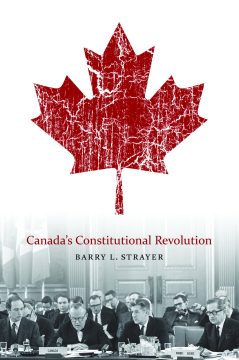Of all countries on earth how many old colonies managed constitutional independence without gunfire? The answer makes a very short list. First is Canada. This rare achievement took many years and much desk-pounding and today is taken for granted. Canada’s Constitutional Revolution is a celebration of the fact.
The late Barry Strayer, a federal judge, recalled only weeks after the 1982 Charter of Rights was proclaimed thieves broke into his Ottawa home: “When the police came and we were discussing it with the detectives, one of them said, ‘Well, there’s probably not much we can do. It used to be before this Charter thing that we’d round up a few of the likely suspects and take ‘em down to the station. We usually got results.’”
Strayer was a constitutional lawyer, ex-CCF organizer and retired assistant deputy justice minister who helped guide the decades-long, peaceful process to a made-in-Canada Constitution. “I think it is legitimate to call it a revolution,” he writes.
Strayer’s Revolution goes beyond a recitation of task forces and telephone calls. His first week in Ottawa in the winter of 1967 it was so cold the Eternal Flame went out: “I reflected briefly on whether this was a metaphor.” In summer the river log booms bobbed past Parliament and the “pungent, sulphurous odours from the pulp and paper mills” blanketed the Hill.
Then there were the people. Jean Chrétien was “quick minded” but bored by details, Strayer recalls. Ray Hnatyshyn joked “he had passed constitutional law only because he had borrowed my notes.”
Joey Smallwood was a name-dropper who “would mention what ‘Dick Nixon’ or ‘President Ceausescu’ of Romania had said to him.” Certain MPs liked to “treat officials as either stupid or malevolent.” W.A.C. Bennett threw terrible parties; he was a teetotaler who liked ginger ale. Pierre Trudeau, when complimented on his elegant office as justice minister in 1967, shrugged: “When a guy joins the Liberal Party he never knows where he’ll end up!”
All these people, every one of them fallible, set out to achieve what so few countries dream of: a calm, orderly transition from colonialism without violence or sectarian hatred. Strayer’s Revolution is so human and matter-of-fact he dispenses with the Charter proclamation ceremony in three paragraphs. The Queen showed up, it rained, that’s it.
Instead he chronicles a warmer story, like the experience of negotiating with First Nations. “We would make a suggestion and their team would sit across the table in silence. This I found unnerving. It instinctively made one think one said something outrageous and that it should be withdrawn.”
“Was it all worth it?” asked Strayer. It was.
By Holly Doan
Canada’s Constitutional Revolution by Barry Strayer; University of Alberta Press; 360 pages; ISBN 9780-8886-4649; $34.95






